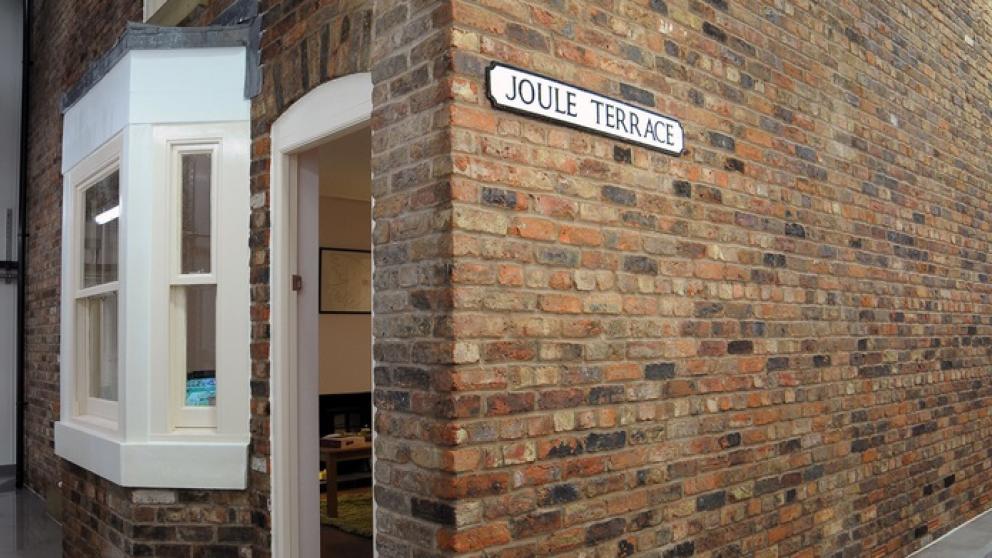Energy House Plays a role in the launch of UK Energy Efficiency Campaign #missingpiece

The University of Salford’s Energy House has been involved in the launch of a campaign driven by Smart Energy GB and the Energy Saving Trust promoting national energy efficiency initiatives. The Missing Piece campaign aims to raise awareness of the impact that energy efficiency can play in helping reach our 2050 carbon targets, and how smart meters can play a pivotal role in helping to reduce energy waste.
Research revealed that less than 3% of our media and social media conversations about climate change in the last two years mention the topic of energy efficiency. Yet, if every household took action on energy efficiency now, we could achieve 11% of the UK’s 2050 carbon targets.
Energy House at The University of Salford is an energy efficiency test facility. It undertakes ground-breaking research on smart meters and their effects and has worked with some of the leading manufacturers in the field. It is the only fully climate-controlled research facility in the world with a fully functioning home inside.
Dr Richard Fitton, Research Lead at The University of Salford’s Energy House said: “Our research has shown how people can make positive changes to climate change by taking small steps in their home.
“We have carried out many in-depth studies on energy saving technologies in controlled conditions and out in the field. These contribute to the large amount of evidence which supports the fact that energy efficiency measures are key to delivering on our carbon targets. One of the ways we can make better decisions about energy efficiency in our homes is through a smart meter.”
The installation of smart meters helps households become more aware of their energy use. By pooling all the data from the nation’s smart meters, a smart energy system can prevent waste at source by making far better assessments of the nation’s energy needs. This reduces our carbon footprint and contributes to the ongoing battle against climate change.
The campaign is supported by conservationist, TV presenter and campaigner Chris Packham. The #missingpiece campaign, shows how infrequently energy efficiency is referenced in climate change discussions in Parliament, the media, TV documentaries and on social media in the past two years.
The campaign also highlighted that:
- 61% of the British public would be more inclined to try and prevent climate change if they better understood what they could do;
- Less than a fifth (19%) of Brits think that having a smart grid which uses data to make the nation more energy efficient) would have the biggest impact on stopping climate change;
- Just three in 10 (30%) think that being more energy efficient would have the biggest impact on protecting the environment;
- Being part of a smart grid was second from bottom in a list of actions people believe the public could take in their homes to help the nation be more energy efficient, only just ahead of keeping curtains closed at all times (9%).
Professor Will Swan, Head of Research at The University of Salford’s Energy House said: “Being part of the #missingpiece campaign highlights the importance of Energy House as a leading research facility in this area.
“The report clearly outlines how smart meters are the foundation of a smart energy system, which can play a crucial role in tackling climate change.”
Join the conversation #missingpiece
Notes to editors:
Consumer understanding of climate change
4000 UK adults surveyed by OnePoll July 2019
Prominence research
The prominence research looks at the frequency of climate change conversation and the extent such discussions also refer to energy efficiency across four areas:
- Mainstream media in UK daily news sources, regional newspapers, news broadcast coverage (TV and radio) and magazines;
- Documentaries by reviewing the synopses of UK documentaries released between July 2017 and July 2019 on IMDb. This was supplemented by ‘Subtitles to save the World’ BAFTA albert research released in May 2019;
- Politics through searches of debates carried out in the House of Commons and House of Lords (Hansard), Scottish Parliament (The Official Report) and Welsh Assembly (The Record). An analysis of MPs Tweets was also conducted;
- Social media through analysis of UK Twitter mentions.
For all channels, the date range for analysis was 28 July 2017 to 28 July 2019, using the same keywords to maintain consistency. However, consistency in date ranges was not possible for regional newspapers, news broadcast coverage and magazines as only one year’s worth of analysis was possible due to data restrictions. These channels have therefore been removed from final analysis.
For all press office enquiries please email communications@salford.ac.uk.
Share:
